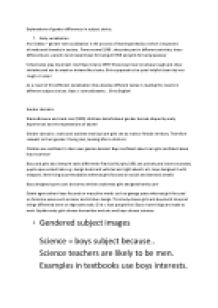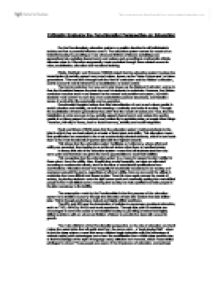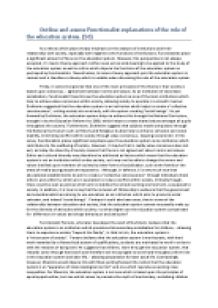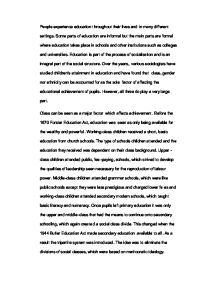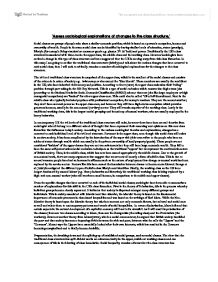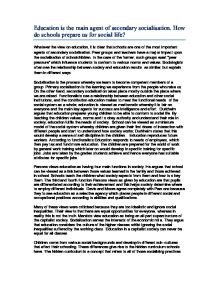Education
Education
Education has grown massively in importance through the 20th and 21st centuries. In 2014-15 around £90 billion will be spent on education by the British government. Young people in Britain have to stay in education and training between the ages of 5 and 18 most cases. So education is seen as very important for a society’s wellbeing and development. This is because education is a key method of passing on culture and skills to the next generation. As societies become more complex, the transmission of core values to the next generation is a key element of socialisation. At the same time complex societies require a wide range of skills, from basic literacy and numeracy to teamwork, problem solving and the ability to co-operate with others. Of course education is not the only social institution responsible for the process of socialisation – the family is also vital. However, as the 20 th century progressed, governments of all political parties have believed that education is the key to both economic prosperity and social harmony. For this reason the underachievement experienced by certain groups, in particular poorer sections of the population, have been of great concern to sociologists. If the opportunities provided by education are not being spread among all social groups then that is both unfair and inefficient.
Explore more on education...
- MAIN THEORIES - Explore some of the main theories involved with education
- POLICY DEBATES - Read through some of the policy debates currently surrounding education
- KEY ISSUES - Look at key issues in education, such as gender inequality and social class
Education essays
Education, education, education. What are the main theories, issues and debates around education? Find out with our dedicated Study Guide and learn tips for your own essays and coursework.
Gender and Education. Explanations of gender differences in subject choice notes.
Explanations of gender differences in subject choice. 1. Early socialisation Ann Oakley â gender role socialisation is the process of learning behaviour
Critically Evaluate the Functionalist Perspective on Education
Critically Evaluate the Functionalist Perspective on Education For the Functionalists, education performs a positive function for all individuals in...
Outline and assess Functionalist explanations of the role of the education system.
As a theory which places heavy emphasis on the analysis of institutions and their relationship with society, especially with regards to the functions...
How do the three factors of class, gender and ethnicity affect achievement in education?
People experience education throughout their lives and in many different settings. Some parts of education are informal but the main parts are formal where...
Assess sociological explanations of changes to the class structure
'Assess sociological explanations of changes to the class structure.' Social classes are groups of people who share a similar economic position; which is...
Education is the main agent of secondary socialisation. How do schools prepare us for social life?
Education is the main agent of secondary socialisation. How do schools prepare us for social life? Whatever the view on education, it is clear...


